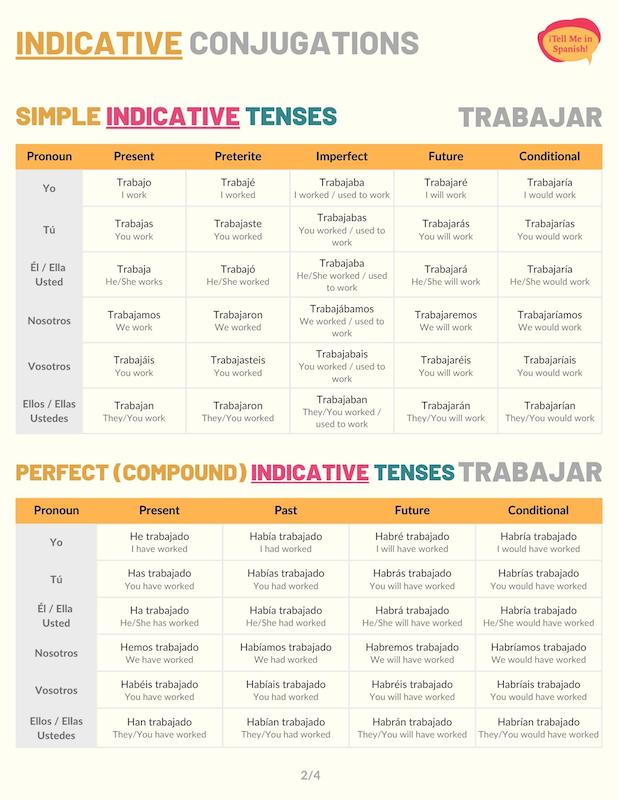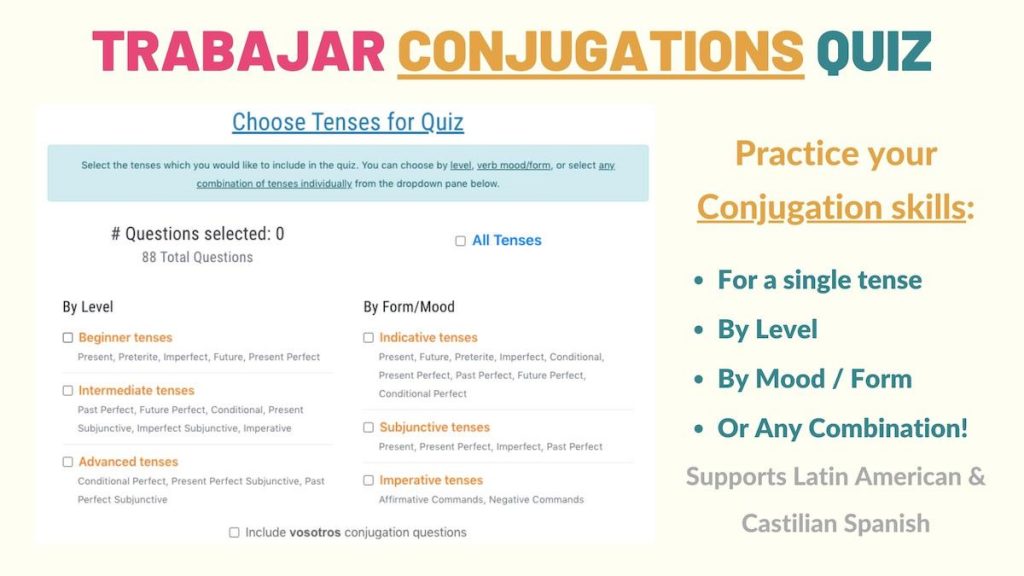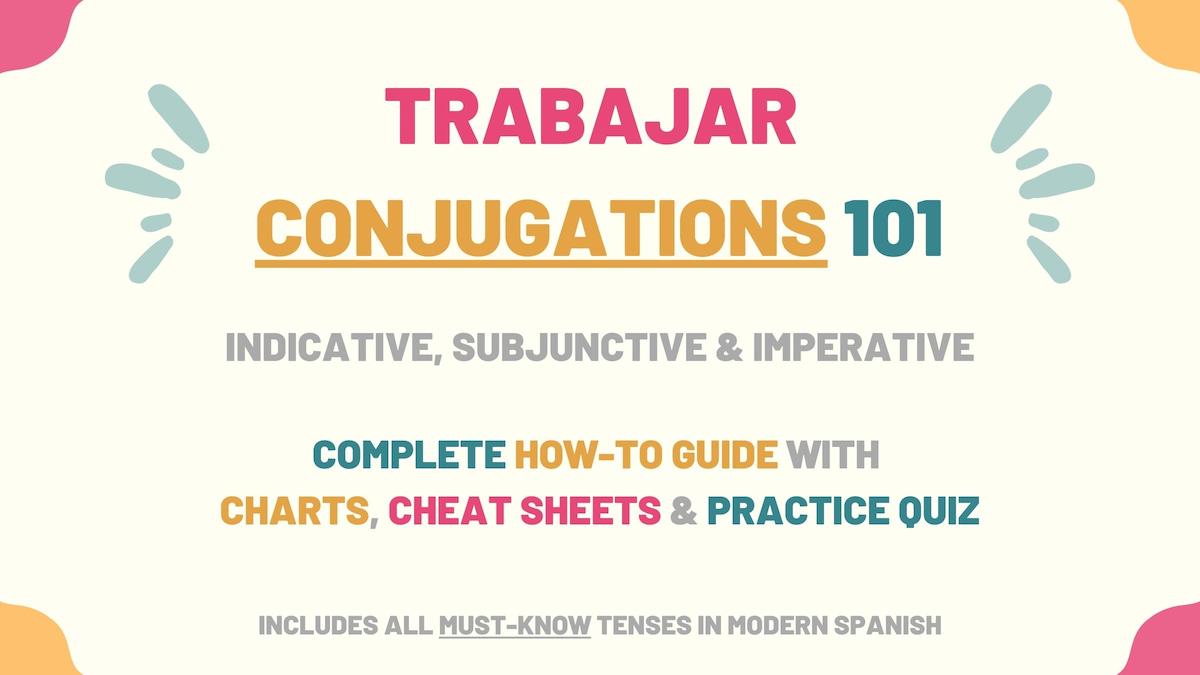Trabajar conjugation patterns are great for practicing and reinforcing the conjugation of -AR verbs in Spanish. As a result, in this guide, you’ll learn how to conjugate this verb. Here is a quick summary of what we’ll cover:
- Trabajar Overview
- Indicative Tenses of Trabajar Conjugations
- Subjunctive Tenses of Trabajar Conjugations
- Imperative (Commands) of Trabajar Conjugations
- Uses & Examples
- Download Trabajar Conjugation Tables & Uses Cheat sheets
- Trabajar Conjugation Practice Quiz
Overview of Trabajar
| Verb Characteristic | Property |
|---|---|
| Verb Type | -AR |
| Irregular | No |
| Infinitive | Trabajar |
| Gerund (Present Participle) Form | Trabajando |
| Past Participle Form | Trabajado |
| Synonyms | Laborar, dedicarse. |
Indicative Conjugations of Trabajar
Present tense
The present tense conjugations of trabajar are used to talk about a person’s current job or work they perform. They can describe where people work or what their profession is. For instance: ¿En qué trabaja tu esposa?
| Person | Conjugation | Translation |
|---|---|---|
| Yo | Trabajo | I work |
| Tú | Trabajas | You work |
| Él / Ella Usted | Trabaja | He/She works You (formal) work |
| Nosotros | Trabajamos | We work |
| Vosotros | Trabajáis | You work |
| Ellos / Ellas Ustedes | Trabajan | They work You (plural) work |
Preterite tense
Trabajar preterite conjugations are regular. Conjugate this verb to the past preterite tense to talk about a person’s work at a specific moment in the past. For example: En 1995, Tom trabajó conmigo.
| Person | Conjugation | Translation |
|---|---|---|
| Yo | Trabajé | I worked |
| Tú | Trabajaste | You worked |
| Él / Ella Usted | Trabajó | He/She worked You (formal) worked |
| Nosotros | Trabajaron | We worked |
| Vosotros | Trabajasteis | You worked |
| Ellos / Ellas Ustedes | Trabajaron | They worked You (plural) worked |
Imperfect tense
Use trabajar in the imperfect indicative form to describe someone’s work in the past. These descriptions can refer to their job position, the quality of their job, or where they used to work. For example: Mi hermana trabajaba con mi abuela.
| Person | Conjugation | Translation |
|---|---|---|
| Yo | Trabajaba | I worked I used to work |
| Tú | Trabajabas | You worked You used to work |
| Él / Ella Usted | Trabajaba | He/She worked He/She used to work You (formal) worked You (formal) used to work |
| Nosotros | Trabajábamos | We worked We used to work |
| Vosotros | Trabajabais | You worked You used to work |
| Ellos / Ellas Ustedes | Trabajaban | They worked They used to work You (plural) worked You (plural) used to work |
Near future
Use the structure ir (present tense) + a + infinitive (in this case, ‘trabajar’) to conjugate the Spanish near or immediate future. These forms of ‘trabajar’ convey that someone is about to go to work. Mañana no vamos a trabajar.
| Person | Conjugation | Translation |
|---|---|---|
| Yo | Voy a trabajar | I’m going to work |
| Tú | Vas a trabajar | You’re going to work |
| Él / Ella Usted | Va a trabajar | He/She is going to work You (formal) are going to work |
| Nosotros | Vamos a trabajar | We’re going to work |
| Vosotros | Vais a trabajar | You’re going to work |
| Ellos / Ellas Ustedes | Van a trabajar | They’re going to work You (plural) are going to work |
Future simple tense
Trabajar future tense conjugations express that people will work on something or a certain way at some point in the future. Here is an example: Mañana trabajaremos todo el día.
| Person | Conjugation | Translation |
|---|---|---|
| Yo | Trabajaré | I will work |
| Tú | Trabajarás | You will work |
| Él / Ella Usted | Trabajará | He/She will work You (formal) will work |
| Nosotros | Trabajaremos | We will work |
| Vosotros | Trabajaréis | You (formal) will work |
| Ellos / Ellas Ustedes | Trabajarán | They will work You (plural) will work |
Conditional tense
In the Spanish conditional tense, trabajar is used to express that people would work. If needed, you can add circumstances that need to be met for people to work on something or in a certain place. For instance: Yo nunca trabajaría aquí.
| Person | Conjugation | Translation |
|---|---|---|
| Yo | Trabajaría | I would work |
| Tú | Trabajarías | You would work |
| Él / Ella Usted | Trabajaría | He/She would work You (formal) would work |
| Nosotros | Trabajaríamos | We would work |
| Vosotros | Trabajaríais | You would work |
| Ellos / Ellas Ustedes | Trabajarían | They would work You (plural) would work |
Present perfect tense
The Spanish present perfect indicative is formed with the structure haber in the present tense + trabajado (past participle). Use these conjugations to talk about where or how people have or haven’t worked. For instance: Nunca hemos trabajado tan tarde.
| Person | Conjugation | Translation |
|---|---|---|
| Yo | He trabajado | I have worked |
| Tú | Has trabajado | You have worked |
| Él / Ella Usted | Ha trabajado | He/She has worked You (formal) have worked |
| Nosotros | Hemos trabajado | We have worked |
| Vosotros | Habéis trabajado | You have worked |
| Ellos / Ellas Ustedes | Han trabajado | They have worked You (plural) have worked |
Past perfect
Conjugate trabajar to the Spanish past perfect to express that people had worked somewhere or with another person before another prior action or point in the past. For example: ¿Ya habías trabajado aquí?
| Person | Conjugation | Translation |
|---|---|---|
| Yo | Había trabajado | I had worked |
| Tú | Habías trabajado | You had worked |
| Él / Ella Usted | Había trabajado | He/She had worked You (formal) had worked |
| Nosotros | Habíamos trabajado | We had worked |
| Vosotros | Habíais trabajado | You had worked |
| Ellos / Ellas Ustedes | Habían trabajado | They had worked You (plural) had worked |
Future perfect
In the future perfect tense, trabajar communicates that someone will have worked by or before a certain point in the future. For example: Este mes, habré trabajado todos los fines de semana.
| Person | Conjugation | Translation |
|---|---|---|
| Yo | Habré trabajado | I will have worked |
| Tú | Habrás trabajado | You will have worked |
| Él / Ella Usted | Habrá trabajado | He/She will have worked You (formal) will have worked |
| Nosotros | Habremos trabajado | We will have worked |
| Vosotros | Habréis trabajado | You will have worked |
| Ellos / Ellas Ustedes | Habrán trabajado | They will have worked You (plural) will have worked |
Conditional perfect
When conjugated to the Spanish conditional perfect tense, trabajar is used to express that someone would have worked somewhere if a past condition had been met. You can also use this tense to make hypotheses that are difficult to accomplish about a person’s work.
For example: Si te hubieran ofrecido más dinero, ¿habrías trabajado aquí?
| Person | Conjugation | Translation |
|---|---|---|
| Yo | Habría trabajado | I would have worked |
| Tú | Habrías trabajado | You would have worked |
| Él / Ella Usted | Habría trabajado | He/She would have worked You (formal) would have worked |
| Nosotros | Habríamos trabajado | We would have worked |
| Vosotros | Habríais trabajado | You would have worked |
| Ellos / Ellas Ustedes | Habrían trabajado | They would have worked You (plural) would have worked |
Progressive tenses
The progressive tenses of trabajar allow you to express that someone is working at the moment of speaking. Or, in the case of past forms (preterite and imperfect), to communicate that a past action was in progress when someone was working.
The progressive tenses are formed with estar + trabajando (present participle). Here is a sentence: ¿Estabas trabajando?
| Progressive Tense | Formula | Translation Example |
|---|---|---|
| Present | Estar (present) + trabajando | I am working |
| Preterite | Estar (preterite) + trabajando | You were working |
| Imperfect | Estar (imperfect) + trabajando | He was working |
| Future | Estar (future) + trabajando | We will be working |
| Conditional | Estar (conditional) + trabajando | They would be working |
Trabajar Subjunctive Conjugations
The Spanish subjunctive allows you to express wishes, doubt or hypothetical situations. Below are the trabajar conjugation charts for the subjunctive tenses.
Present subjunctive
Trabajar present subjunctive conjugations express hopes, wishes, or requests related to a person working. For example: Quiero que trabajen todo el día.
| Person | Conjugation | Translation |
|---|---|---|
| Yo | Trabaje | I work |
| Tú | Trabajes | You work |
| Él / Ella Usted | Trabaje | He/She works You (formal) work |
| Nosotros | Trabajemos | We work |
| Vosotros | Trabajéis | You work |
| Ellos / Ellas Ustedes | Trabajen | They work You (plural) work |
Present perfect subjunctive
Haber in the present subjunctive + trabajado is the formula we use to conjugate ‘trabajar’ to the present perfect subjunctive. These conjugations are used to wonder or wish that a person has worked in a certain way or somewhere. For example: Dudo que Luis haya trabajado todo el día.
| Person | Conjugation | Translation |
|---|---|---|
| Yo | Haya trabajado | I have worked |
| Tú | Hayas trabajado | You have worked |
| Él / Ella Usted | Haya trabajado | He/She has worked You (formal) have worked |
| Nosotros | Hayamos trabajado | We have worked |
| Vosotros | Hayáis trabajado | You have worked |
| Ellos / Ellas Ustedes | Hayan trabajado | They have worked You (plural) have worked |
Imperfect subjunctive
Use the imperfect subjunctive conjugations of ‘trabajar’ to refer to past suggestions, requests, wishes, or expectations you had about a person working. Esperaba que no trabajaras hoy.
Depending on the type of Spanish you use, there are two conjugation models for the imperfect subjunctive:
Latin American Spanish version
| Person | Conjugation | Translation |
|---|---|---|
| Yo | Trabajara | I worked |
| Tú | Trabajaras | You worked |
| Él / Ella Usted | Trabajara | He/She worked You (formal) worked |
| Nosotros | Trabajáramos | We worked |
| Ellos / Ellas Ustedes | Trabajaran | They worked You (plural) worked |
Note: In Latin American Spanish, the pronoun vosotros is not used. As a result, we’ve omitted this pronoun from the previous conjugation table.
Castilian Spanish version
| Person | Conjugation | Translation |
|---|---|---|
| Yo | Trabajase | I worked |
| Tú | Trabajases | You worked |
| Él / Ella Usted | Trabajase | He/She worked You (formal) worked |
| Nosotros | Trabajásemos | We worked |
| Vosotros | Trabajaseis | You worked |
| Ellos / Ellas Ustedes | Trabajasen | They worked You (plural) worked |
Past perfect subjunctive
The past perfect subjunctive of trabajar communicates that someone would have worked if a past condition was met. We also use this tense to talk about regrets related to working. For example: Si hubieras trabajado aquí, habrías ganado más dinero.
| Person | Conjugation | Translation |
|---|---|---|
| Yo | Hubiera trabajado | I had worked |
| Tú | Hubieras trabajado | You had worked |
| Él / Ella Usted | Hubiera trabajado | He/She had worked You (formal) had worked |
| Nosotros | Hubiéramos trabajado | We had worked |
| Vosotros | Hubierais trabajado | You had worked |
| Ellos / Ellas Ustedes | Hubieran trabajado | They had worked You (plural) had worked |
Trabajar Imperative Conjugations
To give orders to people, we must use the imperative tense in Spanish.
Affirmative commands
Use trabajar’s affirmative commands to order someone to work. For instance: Trabaja más duro.
| Person | Conjugation | Translation |
|---|---|---|
| Tú | Trabaja | Work |
| Usted | Trabaje | Work |
| Vosotros | Trabajad | Work |
| Ustedes | Trabajen | Work |
Negative commands
To order people not to work, you must conjugate trabajar to the negative imperative. For example: Papá, no trabajes más, descansa.
| Person | Conjugation | Translation |
|---|---|---|
| Tú | No trabajes | Don’t work |
| Usted | No trabaje | Don’t work |
| Vosotros | No trabajéis | Don’t work |
| Ustedes | No trabajen | Don’t work |
Meanings of Trabajar & Examples
Now that you’ve learned how to conjugate trabajar in Spanish, you should check these examples to see how to use this verb in real-world contexts.
[Trabajar conjugated] + [complement]
Mañana trabajamos hasta las 10.
Tomorrow, we work until 10.
¿Tú trabajarías de maestra?
Would you work as a teacher?
Sally siempre ha trabajado en este hospital.
Sally has always worked at this hospital.
Take Note: You can combine trabajar with Spanish prepositions to deliver different meanings, such as schedules, work positions, and workplaces.
Download Trabajar Conjugation Charts & Uses Cheat sheets

I’ve created a PDF with the trabajar conjugation tables for future reference if you need a refresher on all of this verb’s tenses. It also includes its uses and real-world examples.
Practice Quiz: Trabajar Conjugation

Now that you know how to conjugate trabajar in Spanish, you can master this verb by taking the trabajar conjugation practice quiz. This can help you commit all of this verb’s forms to memory.



